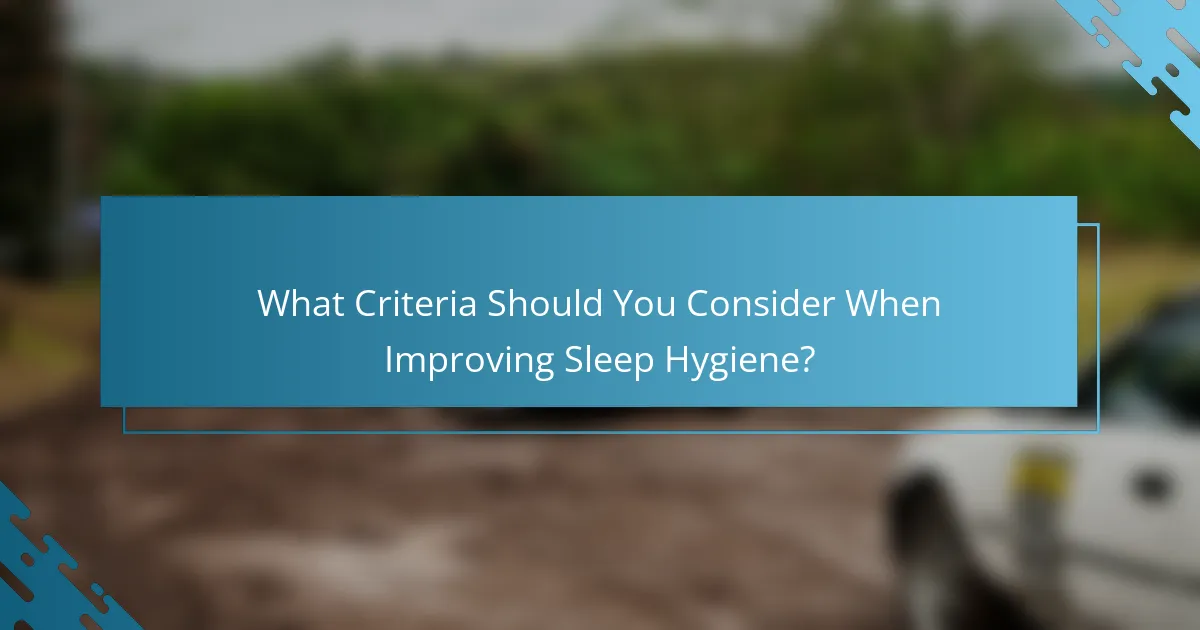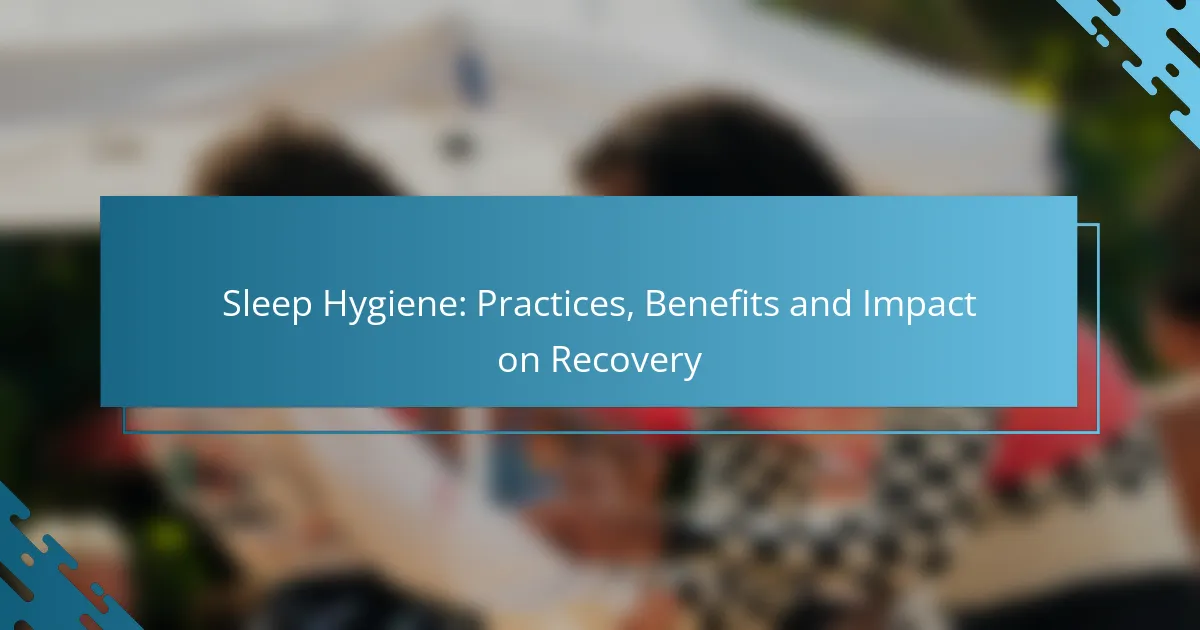Sleep hygiene encompasses habits and environmental factors that foster consistent, restorative sleep, essential for overall well-being. By adopting effective sleep practices, individuals can significantly enhance their sleep quality, leading to improved recovery, cognitive function, and emotional health.

What Are Effective Sleep Hygiene Practices?
Effective sleep hygiene practices are habits and environmental factors that promote consistent, restful sleep. By incorporating these practices, individuals can enhance their sleep quality and overall well-being.
Consistent sleep schedule
Maintaining a consistent sleep schedule involves going to bed and waking up at the same time every day, even on weekends. This regularity helps regulate your body’s internal clock, making it easier to fall asleep and wake up naturally.
Aim for a sleep duration of 7 to 9 hours for most adults. If you struggle to maintain a schedule, consider setting a bedtime alarm to remind you when to start winding down for the night.
Comfortable sleep environment
Your sleep environment should be conducive to rest. This includes a comfortable mattress and pillows, as well as a cool, dark, and quiet room. Consider using blackout curtains, earplugs, or white noise machines to minimize disturbances.
Keep the bedroom dedicated to sleep and intimacy, avoiding work or stressful activities in this space to create a mental association with relaxation.
Limiting screen time before bed
Limiting screen time before bed is crucial as the blue light emitted by phones, tablets, and computers can interfere with melatonin production, making it harder to fall asleep. Aim to turn off screens at least 30 to 60 minutes before bedtime.
Instead of screens, consider reading a book or practicing gentle stretches to help signal to your body that it’s time to wind down.
Avoiding caffeine and heavy meals
Avoiding caffeine and heavy meals in the hours leading up to bedtime can significantly improve sleep quality. Caffeine can stay in your system for several hours, so it’s best to limit consumption after mid-afternoon.
Heavy meals can cause discomfort and indigestion, disrupting sleep. Try to finish eating at least two to three hours before bed and opt for light snacks if you’re hungry.
Relaxation techniques
Incorporating relaxation techniques into your bedtime routine can help calm your mind and prepare your body for sleep. Practices such as deep breathing, meditation, or gentle yoga can reduce stress and promote relaxation.
Consider setting aside 10 to 20 minutes each night for these activities, creating a consistent routine that signals to your body that it’s time to sleep.

How Does Sleep Hygiene Impact Recovery?
Sleep hygiene significantly influences recovery by promoting restorative sleep, which is essential for physical and mental rejuvenation. Good sleep practices can enhance the body’s ability to heal, improve cognitive functions, and strengthen the immune system.
Enhances physical recovery
Quality sleep is crucial for physical recovery as it allows the body to repair muscles, tissues, and cells. During deep sleep stages, growth hormone levels peak, facilitating muscle growth and repair processes. Athletes and active individuals should aim for 7-9 hours of sleep per night to optimize recovery.
Incorporating a consistent sleep schedule, avoiding stimulants before bedtime, and creating a comfortable sleep environment can significantly enhance recovery outcomes. Simple practices like stretching before bed or using relaxation techniques can also promote better sleep quality.
Improves mental clarity
Good sleep hygiene directly contributes to improved mental clarity and cognitive function. Adequate sleep enhances attention, problem-solving skills, and decision-making abilities, which are vital for daily tasks and overall productivity. Aim for uninterrupted sleep cycles to maximize these benefits.
To improve mental clarity, establish a calming pre-sleep routine, limit screen time, and create a dark, quiet sleeping environment. These practices help signal to the brain that it’s time to wind down, leading to more restorative sleep.
Boosts immune function
Proper sleep hygiene plays a key role in boosting immune function, as sleep deprivation can weaken the immune response. During sleep, the body produces cytokines, proteins that are essential for fighting infections and inflammation. Prioritizing sleep can enhance your body’s ability to fend off illnesses.
To support immune health, aim for consistent sleep patterns and ensure you get enough quality sleep each night. Avoiding late-night meals and excessive alcohol can also help maintain a strong immune system, allowing your body to recover more effectively from stress and illness.

What Are the Benefits of Good Sleep Hygiene?
Good sleep hygiene leads to numerous benefits that enhance overall well-being and performance. By adopting effective sleep practices, individuals can experience improvements in productivity, emotional health, and cognitive function.
Increased productivity
Good sleep hygiene significantly boosts productivity by ensuring that individuals wake up feeling refreshed and energized. This leads to better focus and efficiency throughout the day, allowing for more tasks to be completed in less time.
To maximize productivity, aim for 7-9 hours of quality sleep each night. Establishing a consistent sleep schedule and creating a restful environment can help achieve this goal.
Better emotional health
Maintaining good sleep hygiene is crucial for emotional stability. Poor sleep can lead to increased irritability and stress, while adequate rest helps regulate mood and enhances resilience against emotional challenges.
Incorporating relaxation techniques, such as meditation or deep breathing, before bedtime can improve sleep quality and contribute to better emotional health. Avoiding screens and stimulating activities in the evening is also beneficial.
Improved cognitive function
Good sleep hygiene enhances cognitive function, including memory, problem-solving skills, and creativity. Sleep is essential for the brain to process information and consolidate memories, which is vital for learning and decision-making.
To support cognitive health, prioritize uninterrupted sleep and consider short naps during the day if needed. Limiting caffeine intake in the afternoon can also help maintain better sleep quality at night.

What Criteria Should You Consider When Improving Sleep Hygiene?
Improving sleep hygiene involves evaluating personal habits, optimizing the sleep environment, and considering any health conditions that may affect sleep quality. By addressing these criteria, you can enhance your overall sleep experience and promote better recovery.
Personal lifestyle factors
Your daily routines significantly influence sleep hygiene. Factors such as caffeine intake, exercise frequency, and screen time before bed can either support or hinder quality sleep. Aim to limit caffeine consumption in the afternoon and establish a regular exercise schedule, ideally finishing workouts a few hours before bedtime.
Additionally, maintaining a consistent sleep schedule by going to bed and waking up at the same time each day helps regulate your body’s internal clock. This consistency can improve your ability to fall asleep and wake up feeling refreshed.
Sleep environment adjustments
Creating an optimal sleep environment is crucial for enhancing sleep hygiene. Ensure your bedroom is dark, quiet, and cool, as these conditions promote better sleep quality. Consider using blackout curtains, earplugs, or a white noise machine to minimize disturbances.
Investing in a comfortable mattress and pillows tailored to your sleeping position can also make a significant difference. Regularly decluttering your bedroom and keeping it tidy can further contribute to a calming atmosphere conducive to sleep.
Health conditions
Various health conditions can impact sleep hygiene, including anxiety, depression, and sleep disorders like insomnia or sleep apnea. If you suspect a health issue is affecting your sleep, consult a healthcare professional for proper diagnosis and treatment options.
Managing chronic conditions through lifestyle changes, therapy, or medication can improve sleep quality. For example, cognitive behavioral therapy for insomnia (CBT-I) has proven effective for many individuals struggling with sleep issues.

What Tools Can Help You Maintain Sleep Hygiene?
Maintaining sleep hygiene can be supported by various tools designed to enhance your sleep environment and monitor your sleep patterns. These tools can help you establish a consistent routine, minimize disturbances, and create a more conducive atmosphere for restful sleep.
Sleep tracking apps
Sleep tracking apps monitor your sleep patterns and provide insights into your sleep quality. Many of these apps use your smartphone’s sensors to analyze movements and sounds during the night, offering data on sleep stages and duration.
When choosing a sleep tracking app, look for features like sleep cycle analysis, smart alarms, and personalized recommendations. Popular options include Sleep Cycle and Pillow, which can help you identify trends and make adjustments to improve your sleep hygiene.
White noise machines
White noise machines produce a consistent sound that can mask disruptive noises, helping you fall asleep faster and stay asleep longer. These devices are particularly useful in noisy environments or for those who are sensitive to sudden sounds.
When selecting a white noise machine, consider options with adjustable volume levels and a variety of sound choices, such as rain or ocean waves. Some machines even offer timer settings to turn off after you’ve fallen asleep, enhancing your sleep hygiene without unnecessary distractions.
Smart lighting solutions
Smart lighting solutions can help regulate your circadian rhythm by adjusting the intensity and color of light in your home. These systems can simulate natural light patterns, promoting alertness during the day and relaxation in the evening.
Look for smart bulbs or systems that can be programmed to gradually dim in the evening or brighten in the morning. This gradual change can signal to your body when it’s time to wind down or wake up, supporting better sleep hygiene overall.

How Can Sleep Hygiene Practices Vary by Location?
Sleep hygiene practices can differ significantly based on geographical and cultural contexts. Factors such as urbanization, climate, and local customs influence how individuals approach sleep hygiene and the challenges they face.
Urban vs. rural sleep challenges
Urban areas often present unique sleep challenges due to noise pollution, light exposure, and a fast-paced lifestyle. Residents may struggle with distractions from traffic, nightlife, and electronic devices, which can disrupt their sleep cycles.
In contrast, rural areas typically offer quieter environments conducive to sleep but may face challenges such as limited access to healthcare resources and fewer options for sleep aids. Additionally, rural residents might experience variations in temperature and seasonal changes that can affect sleep quality.
To improve sleep hygiene in urban settings, individuals can use blackout curtains, white noise machines, and establish a consistent bedtime routine. For those in rural areas, creating a comfortable sleep environment and utilizing natural remedies can enhance sleep quality.
